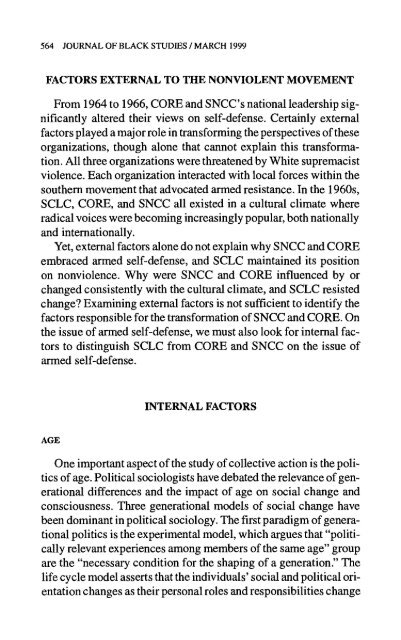MXGM Self-Defence Manual
MXGM Self-Defence Manual
MXGM Self-Defence Manual
You also want an ePaper? Increase the reach of your titles
YUMPU automatically turns print PDFs into web optimized ePapers that Google loves.
564 JOURNAL OF BLACK STUDIES / MARCH 1999<br />
FACTORS EXTERNAL TO THE NONVIOLENT MOVEMENT<br />
From 1964 to 1966, CORE and SNCC's national leadership significantly<br />
altered their views on self-defense. Certainly external<br />
factors played a major role in transforming the perspectives of these<br />
organizations, though alone that cannot explain this transformation.<br />
All three organizations were threatened by White supremacist<br />
violence. Each organization interacted with local forces within the<br />
southern movement that advocated armed resistance. In the 1960s,<br />
SCLC, CORE, and SNCC all existed in a cultural climate where<br />
radical voices were becoming increasingly popular, both nationally<br />
and internationally.<br />
Yet, external factors alone do not explain why SNCC and CORE<br />
embraced armed self-defense, and SCLC maintained its position<br />
on nonviolence. Why were SNCC and CORE influenced by or<br />
changed consistently with the cultural climate, and SCLC resisted<br />
change Examining external factors is not sufficient to identify the<br />
factors responsible for the transformation of SNCC and CORE. On<br />
the issue of armed self-defense, we must also look for internal factors<br />
to distinguish SCLC from CORE and SNCC on the issue of<br />
armed self-defense.<br />
INTERNAL FACTORS<br />
AGE<br />
One important aspect of the study of collective action is the politics<br />
of age. Political sociologists have debated the relevance of generational<br />
differences and the impact of age on social change and<br />
consciousness. Three generational models of social change have<br />
been dominant in political sociology. The first paradigm of generational<br />
politics is the experimental model, which argues that "politically<br />
relevant experiences among members of the same age" group<br />
are the "necessary condition for the shaping of a generation." The<br />
life cycle model asserts that the individuals' social and political orientation<br />
changes as their personal roles and responsibilities change


